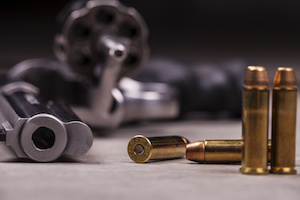A Virginia court will evaluate the validity of forensic ballistic and firearm examination.
The Crime
On February 17, 2018, 74-year-old Mary Jackson and her pregnant granddaughter, 33-year-old Tiffany Byers, were found shot to death at home. The body of Byers’ husband, 45-year-old Aaron Byers, was later found in a shallow grave on a property owned by 37-year-old Paul Brock.
Justin Collins, who was Mary Jackson’s grandson and Tiffany Byers’ brother, testified that he was at the property at the time of his grandmother’s and sister’s shooting. Collins said that he heard a gunshot and did not see the shooter, but heard his sister say, “Paul, you shot me.” Collins later identified a photo of Paul Brock as a person that he recognized as previously visiting his home.
Brock was charged with three counts of capital murder, fetal homicide, tampering with physical evidence, and being a first-degree felony offender in connection with the deaths. Brock would later admit to killing Aaron Byers, but said it was done in self-defense. Brock claims that he had nothing to do with the deaths of Mary Jackson and Tiffany Byers.
The Forensic Examination
A forensic examiner took apart and examined the bullets that were used to kill Mary Jackson, Tiffany Byers, and Aaron Byers. She examined the pieces under a microscope and determined “that the lands and grooves on each individual bullet were of similar agreement, which is what they call it to determine if they were fired from the same gun … all the bullets from all the bodies came from the same weapon.”
The Commonwealth wanted to present this evidence, but Brock’s defense team objected. The court held a Daubert hearing to determine whether the evidence should be admitted.
The Daubert Hearing
Gregory Klees, an examiner with the Bureau of Alcohol Tobacco Firearms and Explosives, testified as an expert witness for the Commonwealth. Klees testified that the firearms testing was valid and that the theories and techniques of ballistics examination have been subject to review for over 100 years. When asked whether he knew of any jurisdictions that did not allow firearms examination testimony, Klees responded, “Except for some individual court cases, I don’t know of any standard or federal courts that have excluded it all together.”
Brock’s defense team called Dr. Jeff Salyards, a Principal Analyst with Compass Scientific Consulting and former Chief Scientist for the US Army Criminal Investigation Laboratory as an expert witness. Dr. Salyards noted his concern with the validity of the peer-review process used by ballistic examiners. Dr. Salyards testified that until recently, the firearms examination field did not use blind review studies. Dr. Salyards also stated that the average industry error rate of less than 2 percent could be attributable to the way that studies surrounding the forensic science had been set up.
At the conclusion of the hearing, Whitley County Circuit Court Judge Dan Ballou ordered both sides to submit briefs on their arguments. The case is scheduled for one additional status hearing prior to Brock’s jury trial, which is scheduled to begin on September 8, 2021.




